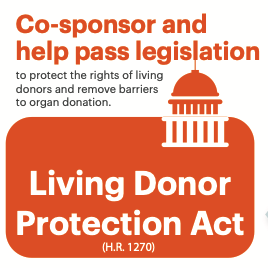A living donor’s perspective
Written by Martha Gershun, Guest Blogger
In early March I joined the virtual National Kidney Patient Consumer Roundtable, organized by the American Association of Kidney Patients (AAKP), the oldest and largest independent kidney patient organization in the country, to present information to its members on “Timely Issues Impacting Kidney Transplant Patients, Drug Innovation, and Living Organ Donors.”
As a living kidney donor and advocate, I was primarily interested in the last webinar of the morning, which focused on current legislative efforts to enact protections for living donors. Two of the session’s presenters were kidney patients with extensive experience on Capitol Hill — Rich Galen, Former Press Secretary to Vice President Dan Quayle and former Speaker of the House Newt Gingrich, as well as Senior Communications Advisor to Kay Bailey Hutchinson, and Richard Knight, former U.S. Congressional senior staff member and Immediate Past President of the AAKP. Galen is a kidney patient currently on dialysis and seeking a living donor, while Knight is a former dialysis patient and 16-year kidney transplant recipient.
The third speaker on the agenda, Dr. Steven Potter, Transplant Surgeon at MedStar Georgetown Transplant Institute, was unable to join due to technical difficulties, so Peggy Tighe, top lobbyist for the American Society of Transplant Surgeons (ASTS), stepped in.
Both Galen and Knight talked about the significant difficulties of life on dialysis, including the fatigue, inconvenience, and impact on the mental health of kidney patients. Noting that a living kidney transplant offers the best outcome for these patients, both encouraged those impacted by kidney disease to actively participate in efforts to pass legislation that would reduce barriers for living kidney donors.
Along with Tighe, they focused on the Living Donor Protection Act (LDPA), introduced in Congress in 2021. Sponsored by Jerrold Nadler (D-NY) and Jaime Herrera Beutler (R-WA), the LDPA would prohibit insurance companies from denying, limiting, or charging higher premiums for life, disability, or long-term care insurance to living donors. It would also ensure that living organ donors can use their time granted under the Family and Medical Leave Act (FMLA) to recover from their organ donation surgery.
I was particularly impressed with the activist focus of the speakers, who all felt strongly that kidney patients could influence public policy by speaking individually and collectively to their elected officials in support of living donor protections. Since every kidney transplant could save the federal government up to $150,000 over the cost of Medicare-funded dialysis, this is not a controversial or partisan issue. As Knight noted: “Cost is not the issue, prioritization is.”
Despite this inspiring message, I was disappointed that the panel members did not go beyond promoting the LDPA to advocate for removing other tangible barriers to living kidney donation, including efforts to ensure that living organ donors are fully compensated for their out-of-pocket expenses and unpaid time off work to donate. We know these financial barriers prevent many from donating, especially among lower-resourced and under-served populations.
Perhaps future AAKP consumer roundtables will explore these additional issues in great depth.
Martha Gershun is a nonprofit consultant and writer living in Fairway, KS with her husband Don Goldman. Her most recent book, Kidney to Share (Cornell University Press, 2021), with co-author John Lantos, MD, details her experience donating a kidney at the Mayo Clinic to a woman she read about in the newspaper. Gershun is a Special Advisor to the Kidney Transplant Collaborative and serves on the Board of the National Kidney Foundation serving Kansas, Oklahoma, and Western Missouri.

